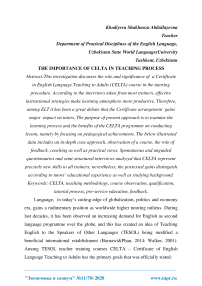The importance of celta in teaching process
Автор: Khodiyeva Sh.A.
Журнал: Экономика и социум @ekonomika-socium
Рубрика: Основной раздел
Статья в выпуске: 11 (78), 2020 года.
Бесплатный доступ
This investigation discusses the role and significance of a Certificate in English Language Teaching to Adults (CELTA) course in the tutoring procedure. According to the interviews taken from most trainers, effective instructional strategies make learning atmosphere more productive. Therefore, among ELT it has been a great debate that the Certificate arrangement gains major impact on tutors. The purpose of present approach is to examine the learning process and the benefits of the CELTA programme on conducting lesson, namely by focusing on pedagogical achievements. The below illustrated data includes an in-depth case approach, observation of a course, the role of feedback, coaching as well as practical views. Spontaneous and unguided questionnaires and semi-structured interviews analyzed that CELTA represent precisely new skills to all trainers; nevertheless, the possessed gains distinguish according to tutors’ educational experience as well as studying background.
Celta, teaching methodology, course observation, qualification, tutorial process, pre-service education, feedback
Короткий адрес: https://sciup.org/140251614
IDR: 140251614
Список литературы The importance of celta in teaching process
- Alan B. (2015). Continuous Professional Development for Novice Teachers of English. USChina Education Review B, 5(8), p. 527-534.
- Bailey, K. M., Curtis, A., &Nunan, D., (2001). Pursuing professional development: The self as source. Boston, MA: Heinle&Heinle.
- Barduhn, S., & Johnson, J. (2009). Certification and professional qualification. In A. Burns & J. C. Richards (eds.), The Cambridge guide to second language teacher education (pp. 59-65). Cambridge: Cambridge University Press.
- Borg, M. (2001). Learning to teach: CELTA trainees' beliefs, experiences and reflections., (Unpublished PhD thesis), University of Leeds, UK.
- Cosh, J. (1999). Peer observation: A reflective model. ELT Journal 53/1, 22-27.
- Crookes, G. (2003). A practicum in TESOL. Cambridge: Cambridge University Press.
- Hobbs, V. (2007). Examining short-term ELT teacher education: an ethnographic case study of trainees experiences. Unpublished doctoral thesis. University of Sheffield: Sheffield, UK.
- Richards, J. C. (1998). Beyond training: perspectives on language teacher education. Cambridge: Cambridge University Press.
- Study CELTA: English Teacher Training. (2015). Retrieved from www.studycelta.com


